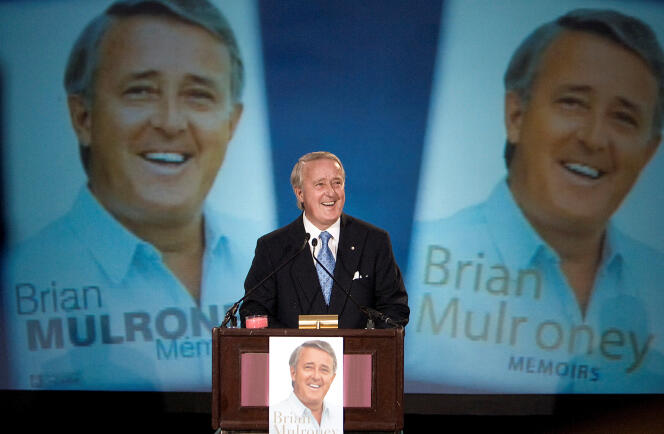
Former Canadian prime minister Brian Mulroney, who made his political mark in the 1980s with the signing of a ground-breaking free trade agreement with the United States that later expanded to include Mexico, died on Thursday, February 29.
Mulroney, Canada's last Cold War leader, opposed apartheid in South Africa and helped secure a landmark treaty on acid rain with Washington. But he brought in a consumption tax still reviled by Canadians to this day, and his efforts to drive constitutional reform, in large part to bring wayward Quebec into the fold, ended in failure.
Quick start in politics
Born on March 20, 1939, in Quebec to a family with Irish roots, Mulroney entered university at the young age of 16, where he first got involved with the Progressive Conservatives (now known as the Conservative Party). After finishing law school, he quickly jumped into politics, first seeking the leadership of his party in 1976. When he lost, he took a job as chief executive of a mining company. He was not yet 40 years old.
In 1983, he entered the political fray once again, vying for and winning the leadership of what was then the official opposition. A year later, Mulroney led his Progressive Conservatives to power, bringing an end to almost two decades of Liberal rule in Ottawa with the largest majority government in history. That resounding victory was built on a pledge to bring his native Quebec into Canada's constitutional fold. The French-speaking province had sought to separate from the rest of Canada in 1980, and so did not sign a new constitution in 1982 after Ottawa rejected its demands for more powers. Mulroney committed to having Quebec recognized as a "distinct society" within Canada.
His first year in office was rocky, however, as several of his ministers resigned over scandals. And his lofty goals for Quebec would remain unrealized.
Free trade advocate
On the world stage, Mulroney led a charge against the pro-apartheid regime in South Africa, putting him at odds with British Prime Minister Margaret Thatcher. But his greatest foreign policy achievement would be the rapprochement with the United States under Ronald Reagan – and the resulting watershed in commercial ties.
"I told him: Ronald, I want a comprehensive free trade agreement with you and the United States," he recalled in an interview with Radio-Canada. Negotiations were launched in March 1985. The two leaders of Irish descent sparked a media sensation when they capped the "Shamrock Summit" by singing "When Irish Eyes are Smiling."
Within three years, a deal was struck, but many Canadians were mistrustful of the outcome, with opposition parties accusing Mulroney of having conceded too much. The 1988 election would become a referendum on free trade. Mulroney won, and the deal was implemented.
The treaty would soon be replaced by the North American Free Trade Agreement (NAFTA), which brought in Mexico, creating one of the world's largest trading blocs. "Generally speaking, it's been a success," he told CBC in a 2012 interview. "It hasn't been a panacea but I never viewed it as that."
Scandal
Mulroney's second term was marked by a harsh recession, which forced the government to raise taxes to try to slash a deficit that hit a record high in his final year in office. His proposed constitutional reforms imploded – they were seen as too favorable to Quebec and rejected. "It was the worst moment of my life," he would later recall.
Mulroney also introduced a goods and services tax and oversaw the privatization of one-third of more than 60 state-run corporations including Air Canada. By the time he retired in 1993, his popularity had plummeted; his 11% support made him the most unpopular prime minister in Canadian history.
Less than three months after his exit, the Tories suffered a humiliating election defeat that saw the party's number of seats in the House of Commons reduced from 151 to two. Shortly afterward, Mulroney was caught up in a bribery scandal. A commission of inquiry criticized him for taking more than Can$200,000 in cash from Karlheinz Schreiber, a German-Canadian arms dealer, and broker for Airbus in dealings with Air Canada. The money had changed hands in brown paper bags at three secret hotel meetings. Mulroney ultimately admitted his error in accepting the cash.
Mulroney briefly came out of retirement in 2017 at Trudeau's behest to advise on a new continental trade deal. He worked behind the scenes for months to convince his occasional golfing buddy Donald Trump not to walk away from the talks to revamp NAFTA.